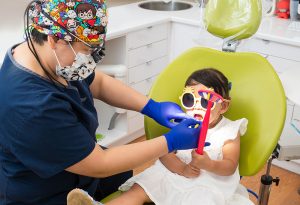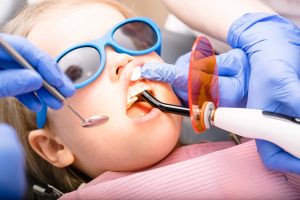CARING FOR CHILDREN WITH AUTISM
The dental management of autistic children requires an understanding and patient team who can appreciate each child’s uniqueness and adapt to their needs.
Our experienced team have over the years developed simple, effective strategies to help autistic children have a pleasant experience at the dentist. Here are some of the strategies:
- Short, frequent appointments to gradually introduce the dental team and equipment that we use.
- Understand your child’s communication styles and work with families to help introduce the dentist as a safe place e.g. visual aids, storyboards etc.
- Bring items that might comfort your child e.g. soft toy or blanket.
- Planning appointment times that would best suit your child’s schedule and routines.
Children who are sensory seeking might also grind their teeth, chew on objects or lip bite, which can cause damage to the oral structures. Speak to your dentist if you are concerned and they will be able to advise you on ways to manage this.
The likelihood of dental decay increases in patients whose diet might be limited to sticky or sweet foods, or for those who have difficulty with brushing and flossing. This is why children and caregivers should be advised about correct daily oral hygiene routines as early as possible. Preventative measures such as additional fluorides, sealants, drinking water throughout the day and taking sugar-free medicines, where appropriate, are recommended.
I would like to conclude that extraordinary children, particularly with autism, require the support of a dental team that truly cares about them as an individual.
CARING FOR CHILDREN WITH CEREBRAL PALSY
Aspects of Cerebral Palsy make a child more susceptible to oral health conditions
Although Cerebral Palsy does not cause oral abnormalities, those with Cerebral Palsy have a greater risk of developing certain oral conditions. In particular, your child’s teeth may look crowded, vary in size and shape, be misaligned (malocclusion), or your child may incur damage from grinding his/her teeth (bruxism).
Children with Cerebral Palsy are also more prone to bacterial infections (periodontal disease) or redness and swelling (gingivitis).
Some aspects of Cerebral Palsy make your child more susceptible to oral health conditions, for example a child who experiences frequent seizures, is more prone to head and mouth trauma, grinding of their teeth, and biting their lips or cheeks.
If your child is not able to control their facial muscles or has trouble swallowing (dysphagia) and chewing they may have difficulty brushing, rinsing, flossing, and clearing food pouches after a meal.
Misalignment of the “bite” (upper and lower teeth), referred to as malocclusion, is commonly found in children with Cerebral Palsy.
Children with Cerebral Palsy are prone to tooth decay
Bacterial plaque can form on teeth exposed to a considerable amount of acid, particularly in children who have gastroesophageal reflux and those who have difficulty with swallowing and chewing. In addition, prescribed medication is often sugary and attaches to tooth enamel. If your child takes longer than normal to consume a meal, food stays in their mouth longer and can increase the potential for cavities. With appropriate oral hygiene tooth decay can be avoided.
CARING FOR A CHILDREN WITH DOWN SYNDROME
Delayed Eruption
On average, babies with Down Syndrome get their first teeth at 12 to 14 months, but in some cases it can be as late as 24 months of age and your child may not get all 20 baby teeth until he/she is 4 to 5 years of age. The front permanent teeth and permanent 6 year old molars may also not erupt until 8 or 9 years of age. It is also common for your child’s teeth to erupt in a different order.
Small and Missing Teeth
It is common that children with Down Syndrome have smaller than average teeth and may be missing some teeth. Your child my also have roots that are shorter than average.
Large Tongues
Children with Down Syndrome may have large tongues or your child may have an average size tongue and a small upper jaw which will make their tongue too large for their mouth.
Problems with Bite
The issue with small teeth is that it can cause spacing between the teeth. A small upper jaw may cause crowding of the teeth which could result in your child’s permanent teeth being “impacted” because there is no room in the mouth for them to come in. The small upper jaw may also create a situation where the top teeth do not go over the bottom teeth the way they are meant to.
Orthodontics (braces) may be able to improve some of these issues. Orthodontics require a lot of cooperation and make the teeth even more difficult to keep clean, so it may not be possible in all cases. It may be a good idea to wait until your child is older and able to tolerate it a bit better. Having orthodontic appliances in the mouth can also pose challenges to speech. It may therefore be a good idea to delay orthodontic treatment until your child’s speech has developed adequately.
Gum Disease
Children with Down Syndrome are at an increased risk for gum disease (periodontal disease), even if your child does not have a lot of plaque and tartar (calculus) because your child’s immune system is likely to be impaired and he/she will generally not have some of the natural protections against the disease. To prevent gum disease brush twice daily, focusing the bristles along the gum line, floss daily, regularly monitor your child’s gum health and take X-rays to monitor their bone levels. If the gums bleed that means that they are inflamed. Brushing and flossing should not be stopped because of this. In fact, brushing and flossing will keep the gums clean and help to minimise the inflammation.



